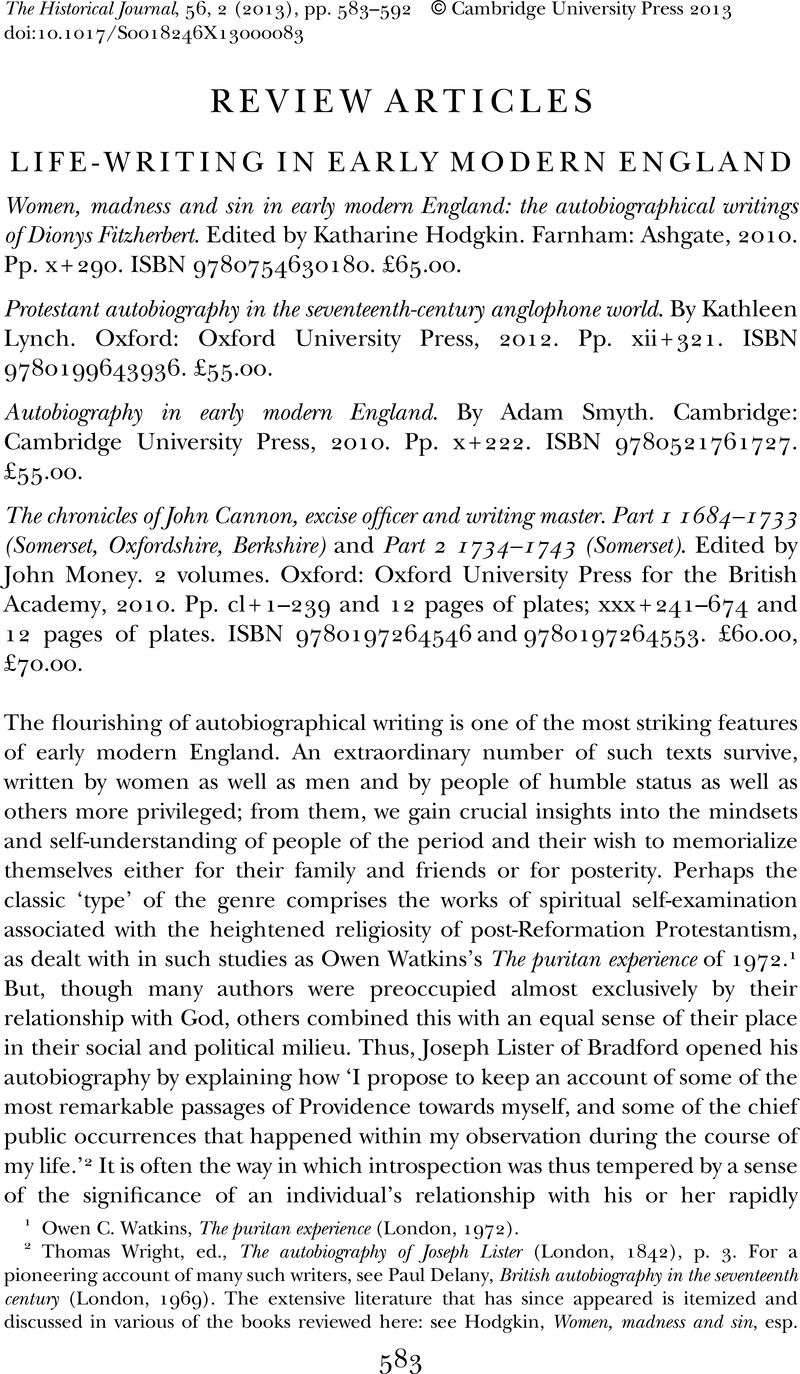No CrossRef data available.
Published online by Cambridge University Press: 03 May 2013

1 Watkins, Owen C., The puritan experience (London, 1972)Google Scholar.
2 Wright, Thomas, ed., The autobiography of Joseph Lister (London, 1842), p. 3Google Scholar. For a pioneering account of many such writers, see Delany, Paul, British autobiography in the seventeenth century (London, 1969)Google Scholar. The extensive literature that has since appeared is itemized and discussed in various of the books reviewed here: see Hodgkin, Women, madness and sin, esp. pp. 35–6; Lynch, Protestant autobiography, Introduction; Smyth, Autobiography, pp. 7–8 and passim.
3 See Mascuch, Michael, Origins of the individualist self: autobiography and self-identity in England, 1591–1791 (Cambridge, 1997)Google Scholar; Wahrman, Dror, The making of the modern self: identity and culture in eighteenth-century England (New Haven, CT, and London, 2004)Google Scholar.
4 Hodgkin, Katharine, Madness in seventeenth-century autobiography (Basingstoke, 2007)CrossRefGoogle Scholar.
5 For instance, the edition by McGuire, J. E. and Tamny, Martin of Certain philosophical questions: Newton's Trinity notebook (Cambridge, 1983)Google Scholar.
6 Along the lines suggested in my Editing early modern texts: an introduction to principles and practice (Basingstoke, 2007), esp. ch. 6.
7 See pp. 84–5, 88, 152, 166–7, 171ff. On censorship, see pp. 37ff, and on Old St Paul's see pp. 113ff.
8 See especially Lechner, J. M., Renaissance concepts of the commonplaces (New York, NY, 1962)Google Scholar; Beal, Peter, ‘Notions in garrison: the seventeenth-century commonplace book’, in Hill, W. Speed, ed., New ways of looking at old texts: papers of the Renaissance English Text Society, 1985–1991 (Binghampton, NY, 1993), pp. 131–47Google Scholar; Moss, Ann, Printed commonplace-books and the structuring of Renaissance thought (Oxford, 1996)CrossRefGoogle Scholar; Sharpe, Kevin, Reading revolutions: the politics of reading in early modern England (New Haven, CT, and London, 2000)Google Scholar; Woolf, Daniel, Reading history in early modern England (Cambridge, 2000), pp. 96ffGoogle Scholar; Sherman, William, Used books: marking readers in Renaissance England (Philadelphia, PA, 2008)CrossRefGoogle Scholar, ch. 7; Blair, Ann, Too much to know: managing scholarly information before the modern age (New Haven, CT, and London, 2010)Google Scholar, esp. ch. 2.
9 See Smyth, Adam, ‘“Rend and teare in peeces”: textual fragmentation in seventeenth-century England’, Seventeenth Century, 19 (2004), pp. 36–52Google Scholar.
10 One oddity about the edition that is worth noting here is its overall title, The chronicles of John Cannon. It is true that on the title-page the title takes the form Χρονεχά seu annales or memoirs, but Cannon seems to have thought of the work as his Memoirs (see, e.g., vol. ii, p. 544) and this is the running title of the manuscript throughout (Somerset Heritage Centre, DD\SAS/C1193/4).
11 Hitchcock, Tim, ‘Sociability and misogyny in the life of John Cannon, 1684–1743’, in Hitchcock, Tim and Cohen, Michèle, eds., English masculinities, 1660–1800 (London, 1999), pp. 25–43Google Scholar; Brewer, John, The sinews of power: war, money and the English state, 1688–1783 (London, 1989), pp. 104ffGoogle Scholar; Money, John, ‘Teaching in the market-place, or “Caesar adsum jam forte: Pompey aderat”: the retailing of knowledge in provincial England during the eighteenth century’, in Brewer, John and Porter, Roy, eds., Consumption and the world of goods (London, 1993), pp. 335–77Google Scholar.
12 See esp. Seaver, Paul S., Wallington's world: a puritan artisan in seventeenth-century London (London, 1985)Google Scholar; Lackington, James, Memoirs (London, 1791 and subsequent editions)Google Scholar; Mascuch, Origins of the individualist self, ch. 2 and passim.
13 Vol. i, pp. cxxxiii–cxxxiv.
14 Vol. i, pp. cxxix–cxxx; Money, ‘Teaching in the market-place’, esp. p. 339.
15 See Allan, David, Commonplace books and reading in Georgian England (Cambridge, 2010)CrossRefGoogle Scholar. Though he nowhere mentions Cannon, in the course of his book Allan notes some features overlapping with those commented on here in connection with Cannon and others: see especially pp. 26 and 30–1 on ‘creative dexterity with graphic instruments in hand’ and part 6 on the inclusion of self-referential and reflective material.
16 Whyman, Susan E., The pen and the people: English letter writers, 1660–1800 (Oxford, 2009), pp. 77–81CrossRefGoogle Scholar, plate 16, and ch. 3, passim. My comments relate particularly to Derbyshire Record Office D5775/1–3.
17 Whyman, Pen and people, pp. 85–7, frontispiece and plate 20.
18 See Bickham, George, The universal penman (London, 1733–41Google Scholar; Dover reprint edition with introductory essay by Philip Hofer, New York, NY, 1954). On the genre as a whole, see Sir Heal, Ambrose, The English writing-masters and their copy-books, 1570–1800 (Cambridge, 1931)Google Scholar.
19 For Jeake, see Hunter, Michael and Gregory, Annabel, eds., An astrological diary of the seventeenth century: Samuel Jeake of Rye 1652–1699 (Oxford, 1988)Google Scholar; for his other manuscript compilations, see the list of Jeake manuscripts in Hunter, Michael, Mandelbrote, Giles, Ovenden, Richard and Smith, Nigel, eds., A radical's books: the library catalogue of Samuel Jeake of Rye 1623–1690 (Woodbridge, 1999), pp. 334–9Google Scholar, 342–3. For Yonge, see his Plymouth memoirs, ed. Beckerlegge, J. J. (Plymouth, 1951)Google Scholar, and his Journal, ed. F. N. L. Poynter (London, 1963). For a single example from a century later, see F. W. Steer, ed., The memoirs of James Spershott, The Chichester papers, no. 30 (Chichester, 1962), but this could be very widely paralleled and much work is needed in this area.